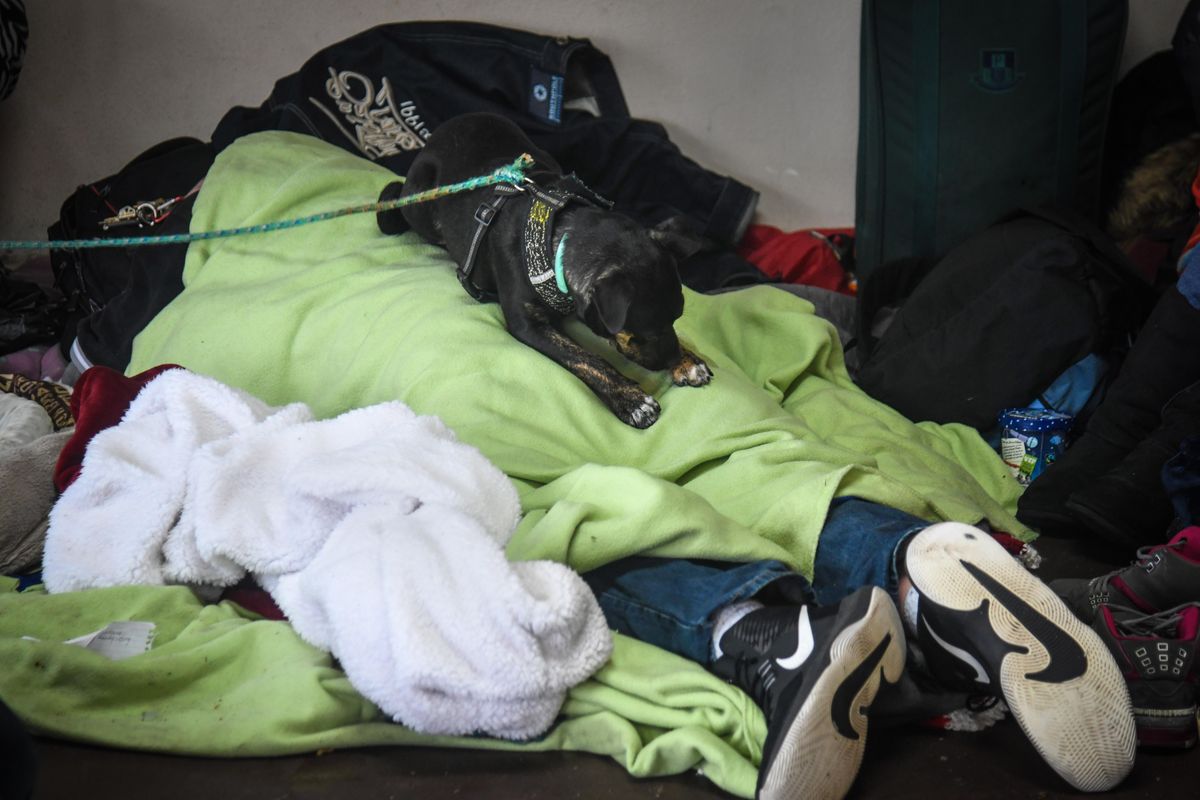Spokane city leaders may buy homeless shelter to keep it open year-round

As the Spokane’s $1.3 million warming center program winds down, city leaders are looking to purchase an emergency shelter to increase the number of shelter beds permanently.
Kelly Keenan, director of the city’s Community, Housing and Human Services Department, said the city is trying to avoid temporarily housing hundreds in one location because it can put vulnerable people in dangerous and undignified situations.
“When we get to very high concentrations of people who are in very difficult circumstances … those places can become magnets for other people that intend to prey on those vulnerable members of the community,” he said.
Instead, there will be a wind-down period for the temporary network of warming centers and the city will purchase one or more buildings to be remodeled into homeless shelters. The city will likely own the building but will contract with another organization to run its day-to-day operations.

The warming centers this season provided about 275 new shelter spaces total, which was more than what was lost when Catholic Charities’ House of Charity reduced its number of beds and stopped providing 24/7 service.
Keenan said the new shelters, once they are online this summer, will add more overnight space than was available during a 24/7 pilot last year. He said the city was considering buying and remodeling the Cannon Street warming center or the former Grocery Outlet on Sprague Avenue.
Michael Shaw, executive director of the Guardians Foundation that runs the Cannon Street warming center, said the building doesn’t have a full bathroom or a kitchen and only half the space is being used. People staying at the shelter have to use portable toilets outside and are staying on mats clustered around the edges of the room.
Keenan said a shelter the city owned would have beds, with some for emergencies and some to allow people to stay longer so they would have more stability while accessing resources.
City Council President Ben Stuckart said service providers in the area weren’t willing or able to buy a building to start a new shelter. He said the city needs to come up with a way to make up for the 150 beds no longer available at the House of Charity.
“It’s a lot more expensive to open temporary warming centers than it is to have another shelter,” he said. “Another shelter is our best option.”
He said if the city owns a shelter, it may not have to spend money on opening warming centers again.
City Councilwoman Lori Kinnear said the council would most likely borrow money from itself to pay for the shelter and avoid using reserves. She said the city is also investing in other resources – such as a one-stop-shop resource center where those recently released from prison or those who are low-income, food-insecure or homeless can connect with service providers – and longer-term housing projects.
City Councilwoman Kate Burke said she hopes buying a shelter and being proactive won’t result in a gap in service from the time one shelter closes and warming centers open. She said the increased visibility of homelessness in downtown Spokane may be because many of those people, especially men who were staying at the House of Charity, no longer have a place to go during the day.
“We can’t have these gaps in services and expect nothing bad to happen,” she said.
While most warming centers are still finalizing the details of their ramp-down period, the Open Doors Family Day shelter will continue to operate until June at greater capacity – 80 beds instead of 45. Director Joe Ader said the shelter hoped to be in its new location in the former Cassano’s Grocery by now but construction won’t be finished until summer.
He said more families end up in the shelter system when the weather is warm because most people with young children can find someone who will let them stay during the colder months. When the weather warms up, many are forced to stay in their cars or in shelters.
“You don’t normally see families on the street,” he said. “It’s a different population.”
During the coldest months of the year, the shelter had some space, but it has been at capacity recently.
Ken Perine, who leads the Spokane Salvation Army, said he plans to keep the East Ermina Avenue shelter open until the end of April. He said the shelter has served about 800 people and been at or close to capacity for several months.
The Salvation Army also intends to bid for a chance to run any future homeless shelter the city purchases. He said if the the organization is chosen to run a new shelter, its goal will be to not only offer people a place to sleep but connect them to resources.
“Our goal is to move people forward,” he said. “We don’t want to house for the sake of housing.”
Shaw, who directs the Cannon Street, Salem Lutheran Church and Westminster Congregational Church centers, said the city has yet to extend their contract after March 31. He said he hopes the shelters also will be able to stay open through April.
Keenan, the city human services director, said the city would announce details of a ramp-down period next week.
When the city does decide on a new shelter, Burke said she hopes it will serve all types of needs, provide locker space for people who need a space to store their belongings during job interviews or other appointments, and offer showers.
“I hope we take the holistic approach,” she said. “I don’t think just having a place to lay your head at night is what everybody needs.”